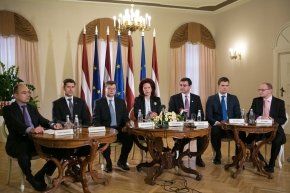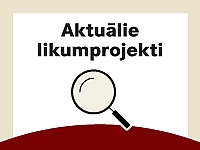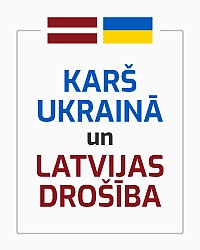 VideoGalerija
VideoGalerija
“The Law adopted today contains detailed legal provisions for introducing the euro in our country. Thus the Law answers many everyday questions important for each resident of Latvia and fosters the feeling of security in society,” Solvita Āboltiņa, Speaker of the Saeima, emphasised on Thursday, 31 January, at a press briefing on the adoption by the Saeima of the Law on the Procedure for Introducing the Euro.
“In my opinion, the most important is the fact that the Law adopted today will dispel concerns among a lot of people in Latvia and will increase the feeling of security and stability among our people,” Āboltiņa remarked, stressing that this is important because in recent decades the people of Latvia have experienced several monetary changeovers, as well as economic and banking crises.
The Speaker of the Saeima expressed her gratification that the adoption of the law was accompanied with broad debates in the parliament, thus providing a chance to hear various arguments and doubts that exist or could be raised. Āboltiņa emphasised that we should not be afraid to speak about the risks connected with the introduction of the euro; all doubts worrying the Latvian people need to be known and dispelled.
Prime Minister Valdis Dombrovskis stressed that introducing the single European currency will benefit the prosperity of Latvia’s people, boost the development of our economy and strengthen Latvia’s international positions. Dombrovskis said that introducing the euro will symbolically conclude the difficult period of overcoming the crisis as he expressed gratification at the Saeima’s responsible decision attesting to the sustainability and maturity of Latvia’s economic and foreign policy.
Jānis Reirs, Chairman of the Budget and Finance (Taxation) Committee of the Saeima, pointed out: “The changeover from the lat to the euro will be performed according to the conversion rate strictly determined by the European Commission and the procedure stipulated in the Law that was adopted today; that will remove concerns about currency speculations and will stimulate the feeling of security among people”.
Reirs emphasised that introduction of the euro will be based on four basic principles. First, continuity of legal instruments means that all agreements and legally binding documents will remain in force on the day of introducing the euro. Second, dual price display means that three months before and six months after introducing the euro, prices will be displayed in both lats and euros on price tags, receipts and proofs of payment. Third, for two weeks after introducing the euro, people will be able to pay in both euros and lats. Fourth, it will be possible to exchange cash for an unlimited period and in unlimited amounts.
Vjačeslavs Dombrovskis, Chairman of the Reform Party parliamentary group, remarked that several important reforms must be carried out alongside the introduction of the euro. While introducing the euro, at the same time Latvia needs reforms in the education system; it is necessary to develop stronger universities and make our higher education institutions competitive. We need to ensure professional management at state capital companies and to establish a development-oriented financial entity that will help to attract investments to export-oriented and innovative enterprises. We have to make sure that the labour force taxes decrease, become business-friendly and stimulate economic growth, Dombrovskis emphasised.
Imants Parādnieks, MP of the National Alliance of All for Latvia! and For Fatherland and Freedom/LNNK parliamentary group, explained his support for the Law by stressing that a currency by itself is not a symbol of a nation’s values. It is just a means of payment that only displays our national symbols, but they will be displayed on the euro as well. Parādnieks also pointed out that the Minister for Finance asserts that with the introduction of the euro, Latvia will gain LVL 40–100 million in the national budget, meaning that these funds can be allocated to Latvian families with children, entrepreneurs or pensioners. If however it were necessary to switch back to lats, only LVL 15 million would be needed to reprint the national currency, said Parādnieks.
In turn, Klāvs Olšteins, who represents the group of independent MPs, pointed out that with the introduction of the euro there will no longer be any charges relating to the exchange of currency and that will save a lot of money. Introducing the euro will make it easier for people to travel and will reduce the administrative burden for entrepreneurs, said Olšteins.
On Thursday, 31 January, the Saeima adopted in the second and final reading the Law on the Procedure for Introducing the Euro, which provides for the procedure by which to effectively and transparently introduce in Latvia the common currency of the European Union – the euro. The Law provides for several measures to be taken regarding the period while both lats and euros will be in circulation, the exchange of cash and transfer currency, price marking of goods and services in two currencies, as well as adaptation of accountancy registers and financial markets.
Saeima Press Service









